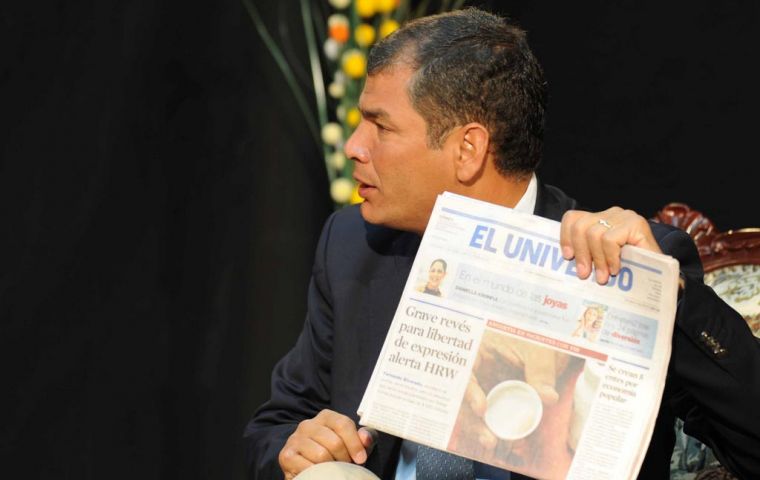MercoPress. South Atlantic News Agency
Ecuadorian high court upholds ruling sentencing journalists to prison and fines
 President Correa obsessed with eliminating non militant media
President Correa obsessed with eliminating non militant media An Ecuadorian appeals court has upheld criminal libel convictions and three-year prison sentences for three newspaper directors and a former editorialist over a column that called populist President Rafael Correa a dictator.
Voting 3-to-1, the judges also upheld 42 million dollars in fines levied in July against the executives of El Universo, the newspaper that published the column by Emilio Palacio that was deemed libelous.
Correa attended Tuesday's court hearing. He said Ecuador has begun to free itself of a corrupt press.
The New York-based Committee to Protect Journalists expressed dismay, calling the decision “a blow to freedom of expression”.
The defendants are free pending appeal to a higher court.
Nicolas Perez, a member from the board of El Universo said “of course” we are going to appeal and will also take the case to the Inter American Human Rights Commission to file a complaint against the ‘irregularities’ of the judicial procedure.
In the controversial column from last February Emilio Palacio anticipated that in a near future a new elected president “maybe an enemy of Rafael Correa could take him to a criminal court for having ordered to open fire at will and with no advance notice against a hospital full of civilians”.
The column was referring to events a year earlier when a police mutiny in demand of wages and working conditions put at risk the life of President Correa and the democratic stability of his elected government, which was finally resolved with the cost of human lives.
The column was considered by Correa as “a calumnious offence” and an attack on his honor and dignity for which he filed a claim and a demand before a criminal court which ruled favorably.
The ruling and the whole demand process has been criticized by press organizations and human rights groups as a direct attack on freedom of expression and freedom of the press.
Correa has had a long feud with the Ecuadorian media which he accuses of belonging to powerful economic groups only geared to the defense of their interests.
A recent referendum with multiple options included a clause severely limiting freedom of the press and opening the way for this kind of claims.




Top Comments
Disclaimer & comment rules-

Read all commentsWhilst Correa may not be your 'traditional' South American dictator, many of his actions whilst in office have become increasingly 'dictatorial'.
Sep 21st, 2011 - 09:33 pm 0Freedom of a *responsible* press and media is an essential tenet of a non-dictatorial state.
Whether the individual media companies have acted irresponsibly and have misrepresented the president and the country is testable on appeal.
But to issue a counter-claim against the state, and against the president in particular, El Universo would have to show that the composition of the judicial panel was 'stacked' and that their judgement was partial.
Using the 'split' on a populist multitargeted referendum to justify the judicial action is, itself, a warping of the democratic process.
So, if warping of democracy is dictatorial, then what we are seeing is dictatorial.
As yet, it falls a little short of the full-blown 'democratic' dictatorship we see in Ecuador's 'partner in crime', Chavezuela.
Commenting for this story is now closed.
If you have a Facebook account, become a fan and comment on our Facebook Page!